Unit 9 Can you come to my party-第一课时 Section A (1a-2d)课件+嵌入音频(共29张PPT)
文档属性
| 名称 | Unit 9 Can you come to my party-第一课时 Section A (1a-2d)课件+嵌入音频(共29张PPT) | 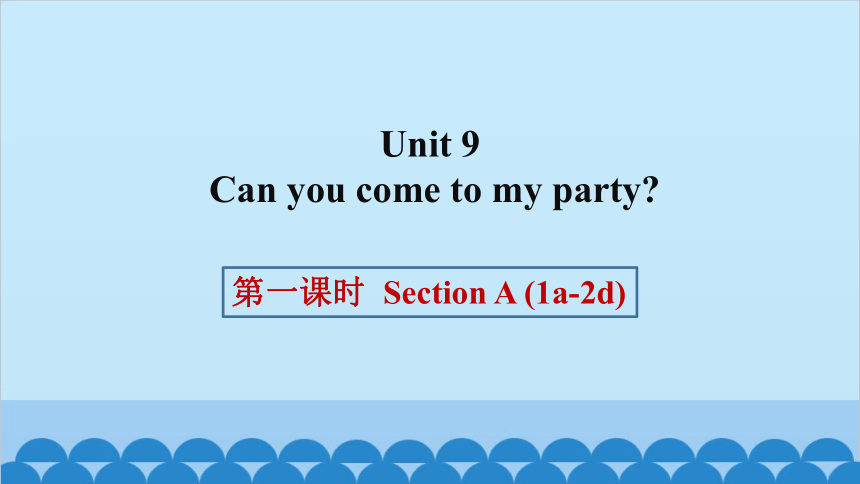 | |
| 格式 | pptx | ||
| 文件大小 | 6.6MB | ||
| 资源类型 | 教案 | ||
| 版本资源 | 人教新目标(Go for it)版 | ||
| 科目 | 英语 | ||
| 更新时间 | 2023-07-13 14:43:30 | ||
图片预览

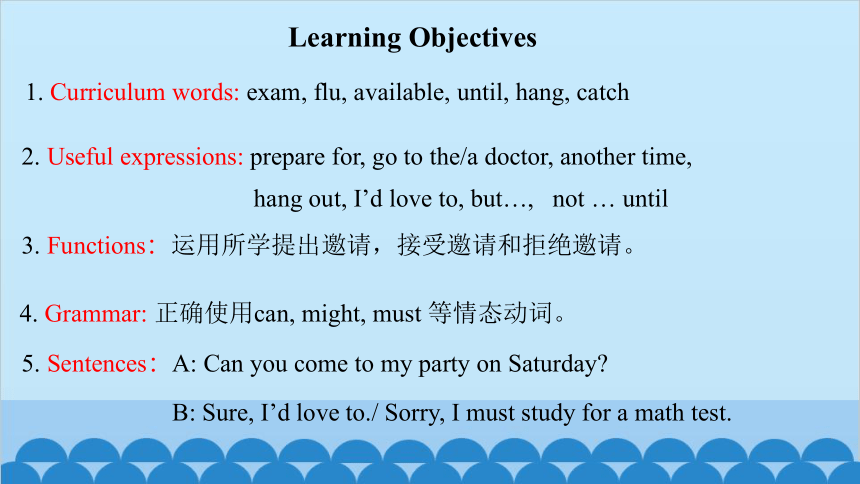
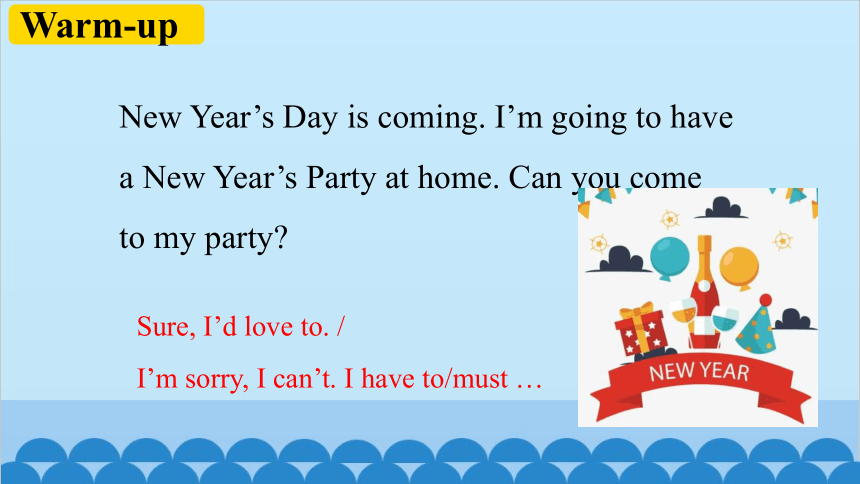
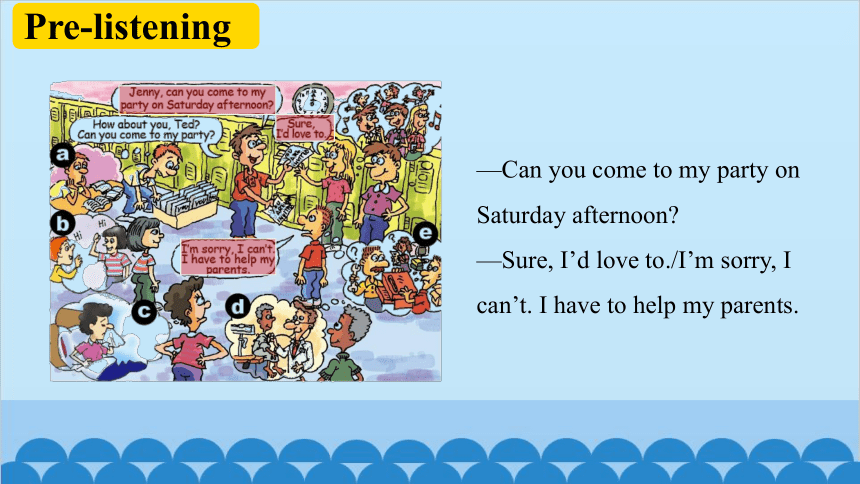
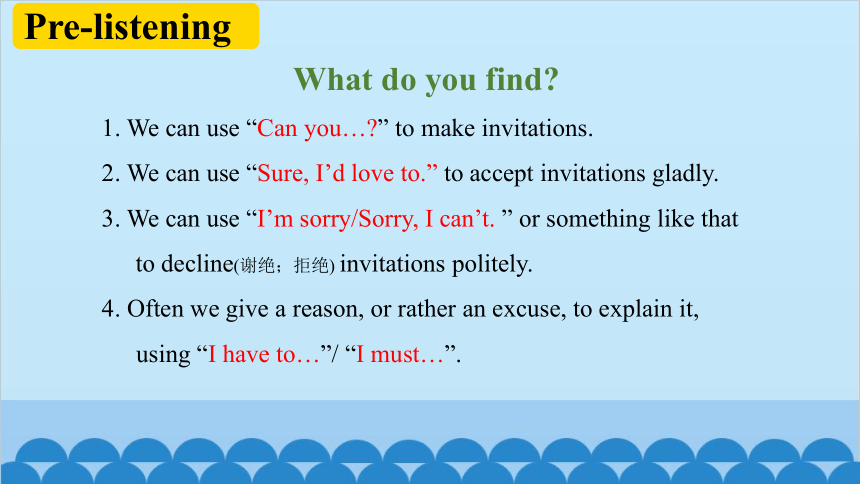
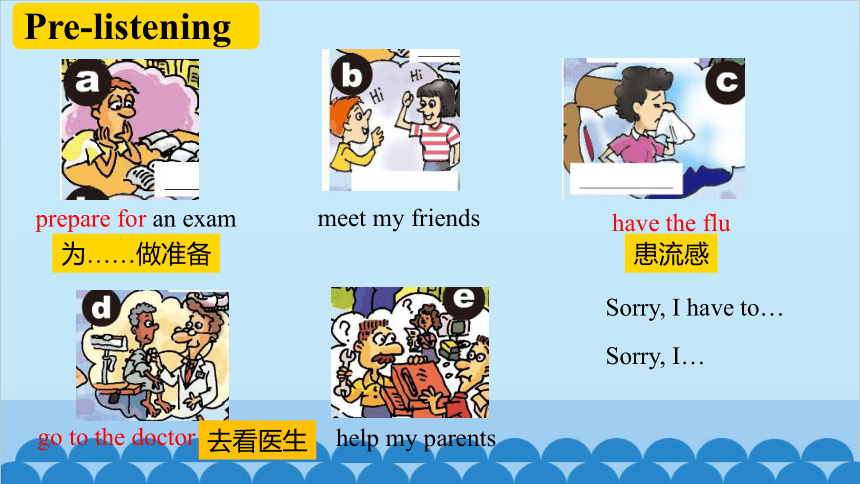
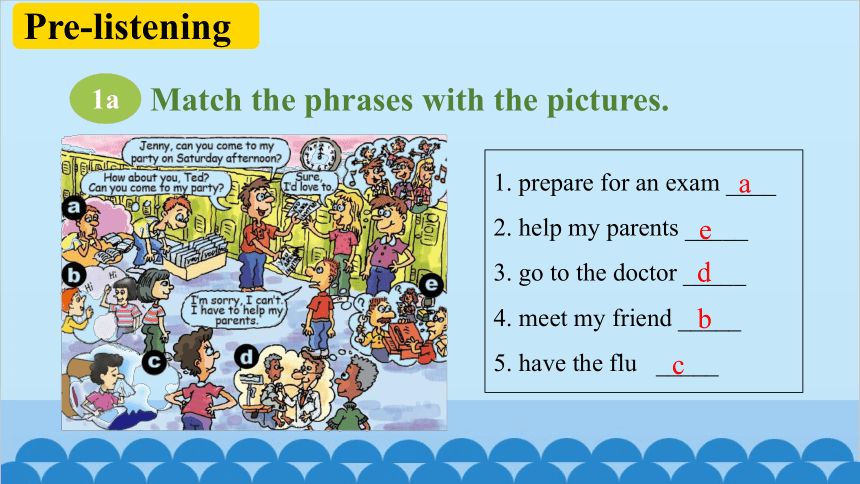
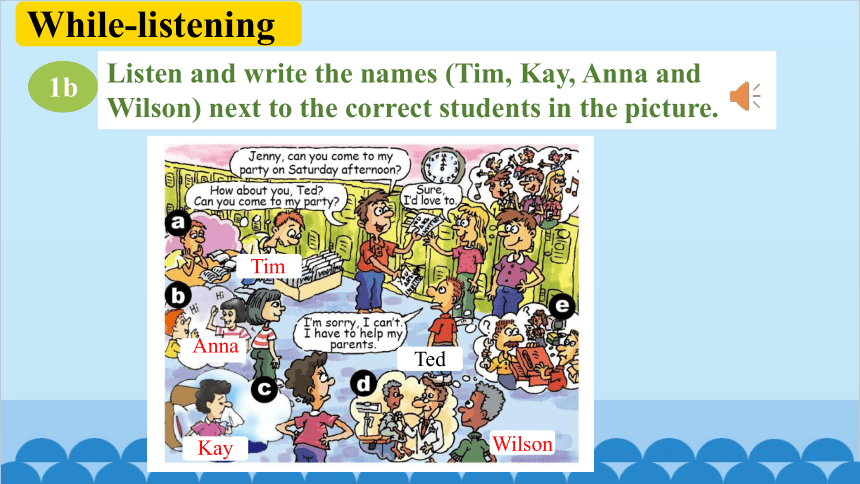
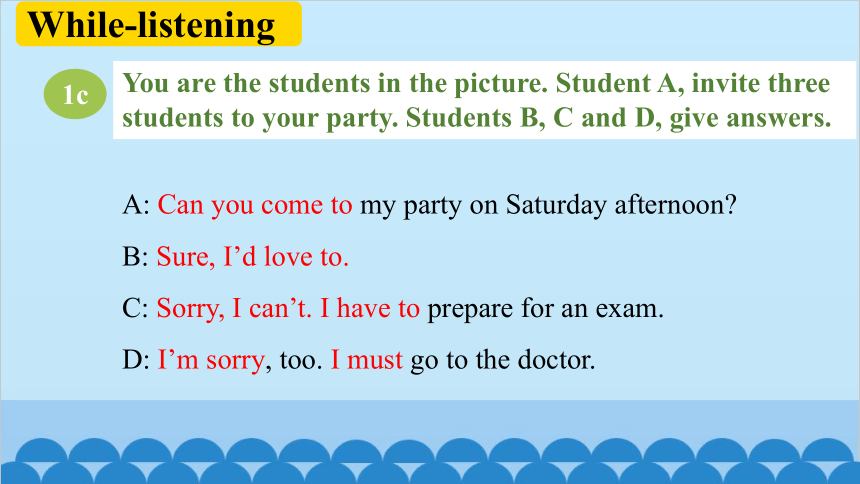
文档简介
(共29张PPT)
Unit 9
Can you come to my party
第一课时 Section A (1a-2d)
Learning Objectives
1. Curriculum words: exam, flu, available, until, hang, catch
5. Sentences:A: Can you come to my party on Saturday
B: Sure, I’d love to./ Sorry, I must study for a math test.
2. Useful expressions: prepare for, go to the/a doctor, another time,
hang out, I’d love to, but…, not … until
3. Functions:运用所学提出邀请,接受邀请和拒绝邀请。
4. Grammar: 正确使用can, might, must 等情态动词。
New Year’s Day is coming. I’m going to have a New Year’s Party at home. Can you come to my party
Sure, I’d love to. /
I’m sorry, I can’t. I have to/must …
Warm-up
—Can you come to my party on Saturday afternoon
—Sure, I’d love to./I’m sorry, I can’t. I have to help my parents.
Pre-listening
What do you find
1. We can use “Can you… ” to make invitations.
2. We can use “Sure, I’d love to.” to accept invitations gladly.
3. We can use “I’m sorry/Sorry, I can’t. ” or something like that to decline(谢绝;拒绝) invitations politely.
4. Often we give a reason, or rather an excuse, to explain it, using “I have to…”/ “I must…”.
Pre-listening
prepare for an exam
go to the doctor
meet my friends
have the flu
help my parents
Sorry, I have to…
Sorry, I…
为……做准备
患流感
去看医生
Pre-listening
Match the phrases with the pictures.
1a
1. prepare for an exam ____
2. help my parents _____
3. go to the doctor _____
4. meet my friend _____
5. have the flu _____
a
e
d
b
c
Pre-listening
1b
Listen and write the names (Tim, Kay, Anna and Wilson) next to the correct students in the picture.
Tim
Kay
Anna
Ted
Wilson
While-listening
1c
You are the students in the picture. Student A, invite three students to your party. Students B, C and D, give answers.
A: Can you come to my party on Saturday afternoon
B: Sure, I’d love to.
C: Sorry, I can’t. I have to prepare for an exam.
D: I’m sorry, too. I must go to the doctor.
While-listening
1. Jeff can/ can’t go to the party.
2. Mary can/ can’t go to the party.
3. May can/ can’t go to the party.
4. Mei Ling can/ can’t go to the party.
5. Paul can/ can’t go to the party.
2a
Listen and circle can or can’t.
While-listening
Names Reasons
Jeff
May
Mei Ling
2b
Listen again. Who can’t go to the party Why Complete the chart.
He might have to meet his friend.
She has the flu.
She must study for a math test.
While-listening
How to refuse invitations
How to accept invitations
I’m sorry, I’m not free.
I’m afraid not. I have the flu.
Sorry, but I’m not available.
Sure. It sounds great.
I’d love to.
我没有空
Post-listening
2c
Look at the reasons in the chart in 2b. Write some more. Then, Student A, invite your partner to do something. Student B, say you can’t go and why.
A: Hey, Dave. Can you go to the movies on Saturday
B: I’m sorry. I’m not available. I have too much homework this weekend.
A: That’s too bad. Maybe another time.
B: Sure, Joe. Thanks for asking.
1.____________________
2. ____________________
3. ____________________
4. ____________________
too much homework
Study for an English test
look after my little sister
visit grandparents
因……而感谢
下次;以后
Post-listening
Read and answer the questions:
1. Can Nick go to Jeff’s house on Saturday
No, he can’t.
2. Why or why not
Because he must prepare for Monday’s exam.
3. Will the friends meet at last
Yes, they will meet on Monday night.
Post-listening
Jeff: Hey, Nick, can you come to my house on Saturday
My cousin Sam from Xi’an is going to be here.
Nick: Oh, Sam! I remember we went bike riding together
last fall when he visited you.
Jeff: Yes, that’s right.
Nick: I’d love to come, but I’m afraid I can’t. I have an
exam on Monday so I must prepare for it.
Jeff: That’s really too bad! Oh, but Sam isn’t leaving until next Wednesday. Can you hang out with us on Monday night
Nick: Sure! Catch you on Monday!
Role-play the conversation.
2d
骑自行车
恐怕不行
闲逛;常去某处
周一见
Post-listening
1. prepare for an exam
(1)exam做可数名词,是examination的简写形式。前面用不定冠词修饰时,应用an。
相关短语有:
Post-listening
Language points
1. prepare for an exam
(2)exam与test:
exam 侧重指正式的考试,如期末考试、入学考试。 He did well in the entrance exam.
他入学考试考得很好。
test 侧重指平时进行的规模较小的测试。 He got a good mark in the test.
他在测试中取得了高分。
Post-listening
Language points
2. have the flu
I feel sore all over — I think I have the flu.
My fever has gone, but I have a cough.
Post-listening
Language points
have the flu意为“患流感”,此处have表示“患病”的意思。类似的短语还有:
3. I’m not available.
(1)available 在此处意为“有空的”,与free意思相同,常在句中作表语。
We are available tonight. Let’s go for a walk.
(2)available 还可意为“可获得的;可用的”。
Tickets are available from the box office(售票处).
Post-listening
Language points
4. I’d love to come, but I’m afraid I can’t.
I’m afraid … 表示“我恐怕……”,用于礼貌地说出令人不快、失望或感到遗憾的事。常用I’m afraid so“恐怕如此”表示肯定;用I’m afraid not“恐怕不行”表示否定。
I’m afraid (that) it’s not finished yet.
— Is it going to rain tomorrow
— I’m afraid so. / I’m afraid not.
Post-listening
Language points
5. Oh, but Sam isn’t leaving until next Wednesday.
(1)until conj. & prep. 到……时;直到……为止
①与延续性动词连用,表示动作或状态一直持续到某时为止。
②与短暂性动词连用,常用于否定句,与not构成not … until结构,表示“直到……才”。
watch TV(延续性)
go to sleep(短暂性)
I watched TV until 11 o’clock last. night.
我昨晚一直看电视直到11点。
I didn’t go to sleep until 11. o’clock last night.
我昨晚直到11点才去睡觉。
Post-listening
Language points
6. Can you hang out with us on Monday night
My brother likes reading and he often hangs out at the bookshop.
hang out 闲逛;常去某处
I hung the picture on the wall.我把这幅画挂在了墙上。
He was hanged during the war. 战争期间他被绞死了。
Post-listening
Language points
7. Catch you on Monday.
(1)catch 作动词,意为“及时赶上;接住;抓住”,过去式为 caught。
Be quick, or we’ll fail to catch the school bus.
Can you catch the ball in one hand
(2)catch 还可意为“感染上”。catch a cold 意为“患感冒”。
(3)catch 的相关短语:
catch up with 跟上,赶上;
catch one’s eye 引起某人注意
Language points
Post-listening
—Can you go to the concert with me, dad —______Let's go.
A.You’re welcome. B.What a pity!
C.Sure, I’d love to. D . Sorry.
I have _____ homework to do.
A. too many B. too much C. much too D. a few
一、单项选择
Exercises
— Hey, Joy. I’m sorry. I can’t go to the movies with you tomorrow afternoon.
— It doesn’t matter. Maybe _______ time.
A. other B. another C. the other D. others
1
3
2
B
C
B
—Alice, can you come to play football with me
—________. When is it
A. I’m sorry I can’t B. Sure, I’d love C. Sure, I’d love to D. No, I can’t
— Hi, Jack. Would you like to come to my birthday party next Friday
— I’d love to. But I’m not ________. I’m leaving for Beijing on that day.
A. believable B. enjoyable C. available D. unbelievable
Some people won’t realize the importance of their health _______ they lose it.
A. because B. afte C. when D. until
4
6
5
C
C
D
Exercises
二、单词填空
This evening I’m studying for the math e_______.
Mr. Li is a_______ in the afternoon, and you can meet him then.
Look! My mom is p_______ for the dinner in the kitchen.
They didn’t ______ (赶上) the last bus, so they took a taxi home.
I don’t feel very well today. I’m afraid I have the _______(流感).
xam
vailable
reparing
catch
flu
1
3
2
4
5
Exercises
三、英汉互译
—周六下午你能来参加我的聚会吗?
—当然,我愿意去。
__________________________________________
__________________________________________
我得准备考试。
__________________________________________
太糟糕了。那下次吧。
__________________________________________
—Can you come to my party next Saturday afternoon
—Sure, I’d love to.
I have to prepare for the exam.
That’s too bad. Maybe another time.
1
3
2
Exercises
Sam isn’t leaving until next Wednesday.
__________________________________________
Can you hang out with us on Monday night
__________________________________________
Catch you on Monday.
__________________________________________
萨姆要一直待到下周三才离开。
周一晚上你能跟我们一起逛逛吗?
周一见。
4
6
5
Exercises
1. Read and recite the new words and 2d.
2. Make a conversation between you and one of your classmates. In the conversation, you’ll have to talk about:
(1) Make an invitation to your party;
(2)Accept or decline the invitation and give reasons.
Homework
Unit 9
Can you come to my party
第一课时 Section A (1a-2d)
Learning Objectives
1. Curriculum words: exam, flu, available, until, hang, catch
5. Sentences:A: Can you come to my party on Saturday
B: Sure, I’d love to./ Sorry, I must study for a math test.
2. Useful expressions: prepare for, go to the/a doctor, another time,
hang out, I’d love to, but…, not … until
3. Functions:运用所学提出邀请,接受邀请和拒绝邀请。
4. Grammar: 正确使用can, might, must 等情态动词。
New Year’s Day is coming. I’m going to have a New Year’s Party at home. Can you come to my party
Sure, I’d love to. /
I’m sorry, I can’t. I have to/must …
Warm-up
—Can you come to my party on Saturday afternoon
—Sure, I’d love to./I’m sorry, I can’t. I have to help my parents.
Pre-listening
What do you find
1. We can use “Can you… ” to make invitations.
2. We can use “Sure, I’d love to.” to accept invitations gladly.
3. We can use “I’m sorry/Sorry, I can’t. ” or something like that to decline(谢绝;拒绝) invitations politely.
4. Often we give a reason, or rather an excuse, to explain it, using “I have to…”/ “I must…”.
Pre-listening
prepare for an exam
go to the doctor
meet my friends
have the flu
help my parents
Sorry, I have to…
Sorry, I…
为……做准备
患流感
去看医生
Pre-listening
Match the phrases with the pictures.
1a
1. prepare for an exam ____
2. help my parents _____
3. go to the doctor _____
4. meet my friend _____
5. have the flu _____
a
e
d
b
c
Pre-listening
1b
Listen and write the names (Tim, Kay, Anna and Wilson) next to the correct students in the picture.
Tim
Kay
Anna
Ted
Wilson
While-listening
1c
You are the students in the picture. Student A, invite three students to your party. Students B, C and D, give answers.
A: Can you come to my party on Saturday afternoon
B: Sure, I’d love to.
C: Sorry, I can’t. I have to prepare for an exam.
D: I’m sorry, too. I must go to the doctor.
While-listening
1. Jeff can/ can’t go to the party.
2. Mary can/ can’t go to the party.
3. May can/ can’t go to the party.
4. Mei Ling can/ can’t go to the party.
5. Paul can/ can’t go to the party.
2a
Listen and circle can or can’t.
While-listening
Names Reasons
Jeff
May
Mei Ling
2b
Listen again. Who can’t go to the party Why Complete the chart.
He might have to meet his friend.
She has the flu.
She must study for a math test.
While-listening
How to refuse invitations
How to accept invitations
I’m sorry, I’m not free.
I’m afraid not. I have the flu.
Sorry, but I’m not available.
Sure. It sounds great.
I’d love to.
我没有空
Post-listening
2c
Look at the reasons in the chart in 2b. Write some more. Then, Student A, invite your partner to do something. Student B, say you can’t go and why.
A: Hey, Dave. Can you go to the movies on Saturday
B: I’m sorry. I’m not available. I have too much homework this weekend.
A: That’s too bad. Maybe another time.
B: Sure, Joe. Thanks for asking.
1.____________________
2. ____________________
3. ____________________
4. ____________________
too much homework
Study for an English test
look after my little sister
visit grandparents
因……而感谢
下次;以后
Post-listening
Read and answer the questions:
1. Can Nick go to Jeff’s house on Saturday
No, he can’t.
2. Why or why not
Because he must prepare for Monday’s exam.
3. Will the friends meet at last
Yes, they will meet on Monday night.
Post-listening
Jeff: Hey, Nick, can you come to my house on Saturday
My cousin Sam from Xi’an is going to be here.
Nick: Oh, Sam! I remember we went bike riding together
last fall when he visited you.
Jeff: Yes, that’s right.
Nick: I’d love to come, but I’m afraid I can’t. I have an
exam on Monday so I must prepare for it.
Jeff: That’s really too bad! Oh, but Sam isn’t leaving until next Wednesday. Can you hang out with us on Monday night
Nick: Sure! Catch you on Monday!
Role-play the conversation.
2d
骑自行车
恐怕不行
闲逛;常去某处
周一见
Post-listening
1. prepare for an exam
(1)exam做可数名词,是examination的简写形式。前面用不定冠词修饰时,应用an。
相关短语有:
Post-listening
Language points
1. prepare for an exam
(2)exam与test:
exam 侧重指正式的考试,如期末考试、入学考试。 He did well in the entrance exam.
他入学考试考得很好。
test 侧重指平时进行的规模较小的测试。 He got a good mark in the test.
他在测试中取得了高分。
Post-listening
Language points
2. have the flu
I feel sore all over — I think I have the flu.
My fever has gone, but I have a cough.
Post-listening
Language points
have the flu意为“患流感”,此处have表示“患病”的意思。类似的短语还有:
3. I’m not available.
(1)available 在此处意为“有空的”,与free意思相同,常在句中作表语。
We are available tonight. Let’s go for a walk.
(2)available 还可意为“可获得的;可用的”。
Tickets are available from the box office(售票处).
Post-listening
Language points
4. I’d love to come, but I’m afraid I can’t.
I’m afraid … 表示“我恐怕……”,用于礼貌地说出令人不快、失望或感到遗憾的事。常用I’m afraid so“恐怕如此”表示肯定;用I’m afraid not“恐怕不行”表示否定。
I’m afraid (that) it’s not finished yet.
— Is it going to rain tomorrow
— I’m afraid so. / I’m afraid not.
Post-listening
Language points
5. Oh, but Sam isn’t leaving until next Wednesday.
(1)until conj. & prep. 到……时;直到……为止
①与延续性动词连用,表示动作或状态一直持续到某时为止。
②与短暂性动词连用,常用于否定句,与not构成not … until结构,表示“直到……才”。
watch TV(延续性)
go to sleep(短暂性)
I watched TV until 11 o’clock last. night.
我昨晚一直看电视直到11点。
I didn’t go to sleep until 11. o’clock last night.
我昨晚直到11点才去睡觉。
Post-listening
Language points
6. Can you hang out with us on Monday night
My brother likes reading and he often hangs out at the bookshop.
hang out 闲逛;常去某处
I hung the picture on the wall.我把这幅画挂在了墙上。
He was hanged during the war. 战争期间他被绞死了。
Post-listening
Language points
7. Catch you on Monday.
(1)catch 作动词,意为“及时赶上;接住;抓住”,过去式为 caught。
Be quick, or we’ll fail to catch the school bus.
Can you catch the ball in one hand
(2)catch 还可意为“感染上”。catch a cold 意为“患感冒”。
(3)catch 的相关短语:
catch up with 跟上,赶上;
catch one’s eye 引起某人注意
Language points
Post-listening
—Can you go to the concert with me, dad —______Let's go.
A.You’re welcome. B.What a pity!
C.Sure, I’d love to. D . Sorry.
I have _____ homework to do.
A. too many B. too much C. much too D. a few
一、单项选择
Exercises
— Hey, Joy. I’m sorry. I can’t go to the movies with you tomorrow afternoon.
— It doesn’t matter. Maybe _______ time.
A. other B. another C. the other D. others
1
3
2
B
C
B
—Alice, can you come to play football with me
—________. When is it
A. I’m sorry I can’t B. Sure, I’d love C. Sure, I’d love to D. No, I can’t
— Hi, Jack. Would you like to come to my birthday party next Friday
— I’d love to. But I’m not ________. I’m leaving for Beijing on that day.
A. believable B. enjoyable C. available D. unbelievable
Some people won’t realize the importance of their health _______ they lose it.
A. because B. afte C. when D. until
4
6
5
C
C
D
Exercises
二、单词填空
This evening I’m studying for the math e_______.
Mr. Li is a_______ in the afternoon, and you can meet him then.
Look! My mom is p_______ for the dinner in the kitchen.
They didn’t ______ (赶上) the last bus, so they took a taxi home.
I don’t feel very well today. I’m afraid I have the _______(流感).
xam
vailable
reparing
catch
flu
1
3
2
4
5
Exercises
三、英汉互译
—周六下午你能来参加我的聚会吗?
—当然,我愿意去。
__________________________________________
__________________________________________
我得准备考试。
__________________________________________
太糟糕了。那下次吧。
__________________________________________
—Can you come to my party next Saturday afternoon
—Sure, I’d love to.
I have to prepare for the exam.
That’s too bad. Maybe another time.
1
3
2
Exercises
Sam isn’t leaving until next Wednesday.
__________________________________________
Can you hang out with us on Monday night
__________________________________________
Catch you on Monday.
__________________________________________
萨姆要一直待到下周三才离开。
周一晚上你能跟我们一起逛逛吗?
周一见。
4
6
5
Exercises
1. Read and recite the new words and 2d.
2. Make a conversation between you and one of your classmates. In the conversation, you’ll have to talk about:
(1) Make an invitation to your party;
(2)Accept or decline the invitation and give reasons.
Homework
同课章节目录
- Unit 1 Where did you go on vacation?
- Section A
- Section B
- Unit 2 How often do you exercise?
- Section A
- Section B
- Unit 3 I'm more outgoing than my sister.
- Section A
- Section B
- Unit 4 What's the best movie theater?
- Section A
- Section B
- Unit 5 Do you want to watch a game show?
- Section A
- Section B
- Unit 6 I'm going to study computer science.
- Section A
- Section B
- Unit 7 Will people have robots?
- Section A
- Section B
- Unit 8 How do you make a banana milk shake?
- Section A
- Section B
- Unit 9 Can you come to my party?
- Section A
- Section B
- Unit 10 If you go to the party, you'll have a grea
- Section A
- Section B
